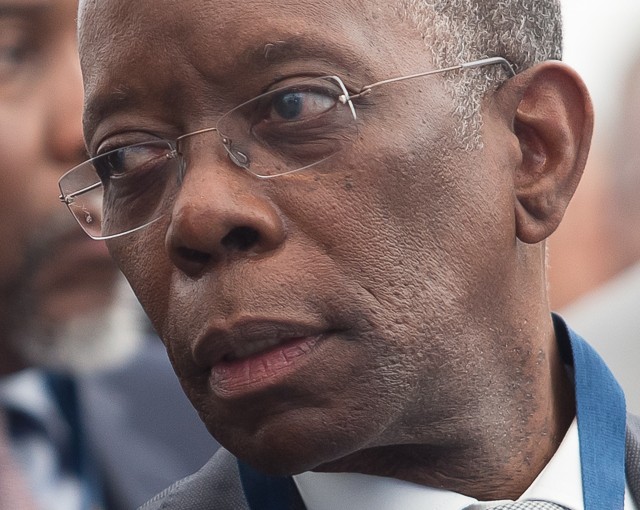Mozambique: Former Plexus Cotton assets to be sold privately as no bidders at auction
No money to pay bondholders, government says – Mozambique

Saint/Louis Studo / Steven Le Vourc'h (File photo) ? Minister of Economy and Finance of Mozambique Adriano Maleiane
The Mozambican Ministry of Economy and Finance has told the holders of bonds initially issued by the Mozambique Tuna Company (Ematum) that it can make no payments to them in 2017, and has very little capacity to make payments on the bonds until 2022.
The Ematum bonds, issued in 2013, were for 850 million US dollars. The stated purpose behind raising these funds was to purchase, from a shipyard in the French port of Cherbourg, 30 vessels – 24 tuna fishing boats, and six modern military speedboats for maritime and coastal protection duty.
The repayment terms were tough – the money was to be repaid over seven years, with a two year grace period, and at an interest rate of LIBOR (London Inter-Bank Offered Rate) plus 6.5 per cent.
The bond issue, organized by the banks Credit Suisse and VTB of Russia, enjoyed a guarantee from the Mozambican government. Investors snapped up the bonds without asking basic questions – such as whether the government guarantee was legal under Mozambican law. (It was not – it smashed through the ceiling on government guarantees laid down in the 2013 budget law).
In April this year 81.5 per cent of the bondholders agreed to a government proposal to replace the Ematum bonds by sovereign government bonds with a longer repayment time, but at a higher interest rate.
The EMATUM bonds (now down to 697 million dollars, after the first repayments) were exchanged for government bonds for 585.5 million dollars that mature in 2023. The interest rate, however, shot up to 10.5 per cent.
For the government, the advantage of the swap was that it would not have to repay the capital until 2023. Until then it would only be obliged to make annual interest payments. The government’s assumption was that by 2023 revenue will be flowing in from the vast natural gas fields in the Rovuma Basin, off the coast of the northern province of Cabo Delgado.
Bu the state of the economy is such that the government cannot even make the interest payments due on the former Ematum bonds. The government explained its plight at a meeting with creditors in London on 25 October, and argued that its only option was to renegotiate its commercial debt, including the former Ematum bonds so as “to reach agreement with creditors on terms compatible with IMF debt sustainability criteria as soon as possible”.
The bondholders were not pleased and set up an organization called the “Global Group of Mozambique Bondholders” (GGMB). In its initial statement, the GGMB demanded that negotiations with the government should only begin once an independent debt audit had been completed and published.
This refers to the audit of Ematum, and of two other loans illicitly guaranteed by the previous government in 2013-2014, to the security-related companies Proindicus and MAM. The audit will be undertaken by the company Kroll, regarded as the top forensic auditing company in the world. Kroll has been given 90 days from signing its contract to deliver the audit.
If the bondholders stick to their current position, negotiations with the government could not start before February, at the earliest.
The Ministry’s new letter to the creditors says it is “encouraged by the willingness of the GGMB to maintain a dialogue with the government regarding the challenges facing Mozambique and the impact of these challenges on the country’s debt payment capacity”.
But it reiterates the position made clear at the 25 October meeting that there is no money available to pay the creditors, at least not in the short term. “The deteriorating macro-economic and fiscal situation”, the ministry statement stresses, “leaves the government with no capacity to make payments to external commercial creditors in 2017 and very little capacity to make payments until 2022 even under an optimistic scenario”.
“In light of these constraints”, the Ministry added, “continuous support from multilateral and official creditors and a debt operation involving Mozambique’s commercial public and publicly guaranteed (PPG) external debt are required alongside other budgetary measures to fill the financing gap”.
The Ministry pointed out that one of the government’s top priorities is to restore normal relations with the IMF. Only when the IMF gives the green light will other financial agencies resume lending to Mozambique.
But the IMF’s own rules mean that “it cannot provide financing to any country whose debt is unsustainable unless steps are to taken to put the country’s debt back on a sustainable path”, the Ministry said. The current debt stock is not sustainable and so the government is committed to finding “a consensual solution” with creditors “to help bring its debt back on a sustainable trajectory and underpin an IMF program that will lay out the path to restoring economic stability”.
In light of these considerations, the Ministry urged the GGMB as well as the lenders to Proindicus and MAM ‘to engage proactively and constructively with the authorities in order to find a consensual solution as soon as possible”.
The Ministry also turns down the GGMB call for favourable treatment. The statement said the government can see “no basis for distinguishing between different holders of commercial PPG external debt, and proposes to treat all such holders on an equitable and pari passu basis in line with best international practice”.
The GGMB demand to delay negotiations until after Kroll’s audit was also unacceptable. The Ministry “does not see any reason to delay negotiations until the completion of the international audit relating to the EMATUM, MAM and Proindicus financings. The audit will not alter the quantum of debt needing to be treated, and any such delay could contribute to a worsening of the current difficult situation – to the detriment of all stakeholders”.
The Ministry urged the commercial creditors “to engage urgently with its financial and legal advisors, based on the principles of transparency, good faith and inter-creditor equity”. These advisers are the French company Lazard Freres and the international law firm White and Case.
One thing to emerge very clearly from the government’s figures presented to the creditors in October is that it was the illicit Ematum, Proindicus and MAM loans that destroyed Mozambique’s debt sustainability.
The debt service, including arrears, is projected at 675.2 million dollars this year, rising to 803.8 million dollars in 2017, 826.8 million in 2018 and 865.5 million in 2019 – sums that are quite impossible for the government to pay.
From 2017 to 2019, easily the largest slice of this debt service is supposed to go on the EMATUM, Proindicus and MAM loans – 591.2 million dollars in 2017, 377.3 million in 2018, and 359.8 million in 2019. In other words, were it not for EMATUM, Proindicus and MAM, the foreign debt would be manageable.












Leave a Reply
Be the First to Comment!
You must be logged in to post a comment.
You must be logged in to post a comment.